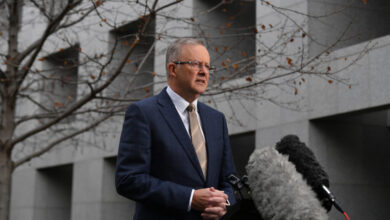
Anthem’s plan will limit reimbursement for anesthesia services during surgeries based on predetermined time limits, using metrics known as “Physician Work Time values” from the Centers for Medicare and Medicaid Services (CMS).
By Stacy M. Brown
NNPA Newswire Senior National Correspondent
@StacyBrownMedia
The assassination of UnitedHealthcare CEO Brian Thompson on a busy Midtown Manhattan Street has intensified scrutiny of Anthem Blue Cross Blue Shield’s controversial new anesthesia reimbursement policy, set to roll out next year in several states. As outrage grows among medical professionals and policymakers, connections between systemic healthcare grievances and the brazen attack have sparked heated discussions across the country.
Anthem’s Policy Under Fire
Anthem’s plan will limit reimbursement for anesthesia services during surgeries based on predetermined time limits, using metrics known as “Physician Work Time values” from the Centers for Medicare and Medicaid Services (CMS). If an anesthesiologist’s care exceeds the allowed time, Anthem will deny payment for the additional time, according to notices issued to providers in states including New York, Connecticut, Missouri, and Colorado.
“With this new policy, Anthem will arbitrarily predetermine the time allowed for anesthesia care during a surgery or procedure,” the American Society of Anesthesiologists (ASA) said in a statement. “If an anesthesiologist submits a bill where the actual time of care is longer than Anthem’s limit, Anthem will deny payment. Anthem will not pay anesthesiologists for delivering safe and effective anesthesia care to patients who may need extra attention because their surgery is difficult, unusual, or because a complication arises.”
Dr. Donald E. Arnold, ASA president, condemned the policy in a strongly worded open letter to Anthem’s parent company, Elevance Health Inc. “The Anthem policy provides no justification for paying for anesthesia services for only a portion of a patient’s surgery,” Arnold wrote, calling the policy “inappropriate and misguided.” He emphasized the potential dangers for patients, especially those requiring extended or complex surgical procedures.
“This egregious policy breaks the trust between Anthem and its policyholders who expect their health insurer to pay physicians for the entirety of the care they need,” Arnold added.
Fallout from UnitedHealthcare CEO’s Assassination
Thompson’s targeted killing has cast a shadow over the healthcare industry. The 7 a.m. attack unfolded outside the Hilton Midtown as Thompson prepared to attend his company’s annual investor conference. Surveillance footage shows the gunman, a masked figure in a hooded jacket, shooting Thompson multiple times, even clearing weapon jams with apparent ease before fleeing. Investigators have since linked the attack to potential grievances within the healthcare system.
A shell casing found at the scene bore the word “depose,” and a live round ejected during the incident was inscribed with “delay.” Police are investigating whether these cryptic messages reference the industry phrase “delay, deny, defend,” often associated with controversial insurance practices.
The NYPD has released photos of a person of interest who was captured smiling at the front desk of a nearby hostel. Law enforcement officials described the suspect as a “light-skinned male” wearing a cream-colored jacket, black face mask, and a distinctive gray backpack. They have offered a $10,000 reward for information leading to the suspect’s arrest.
Thompson’s widow, Paulette, revealed to NBC News that her husband had received threats before his death. “There had been some threats… a lack of coverage? I don’t know details,” she said. “I just know that he said there were some people that had been threatening him.”
Growing Pushback from Policymakers
Meanwhile, Anthem’s policy has already been halted in Connecticut following public outcry. “After hearing from people across the state about this concerning policy, my office reached out to Anthem, and I’m pleased to share this policy will no longer be going into effect here in Connecticut,” Comptroller Sean Scanlon announced.
New York Governor Kathy Hochul also criticized the policy, calling it “outrageous.” She posted on X, “I’m going to make sure New Yorkers are protected. “
Critics argue that Anthem’s policy prioritizes profit over patient care. “The proposed Anthem policy reflects a significant disconnect between Anthem, its patients, and their needs,” said Arnold, who warned that the policy could jeopardize patient safety during more prolonged or complex surgeries.
Medical professionals said anesthesia care should be tailored to the specific needs of each patient. “The length of surgery is a function of the surgeon, not the anesthesiologist,” explained Dr. Dhivya Srinivasa, founder of the Institute for Advanced Breast Reconstruction. “The anesthesiologist is at the mercy of the surgeon for however long they need to take to do the surgery well.”
Unanswered Questions
As Anthem faces mounting criticism, the implications of the assassination and the insurer’s controversial policy remain uncertain. Investigators continue to piece together clues from the attack, including the slaying suspect’s movements and cryptic inscriptions on ammunition.
“We will not rest until we identify and apprehend the shooter in this case,” NYPD Commissioner Jessica Tisch vowed.




